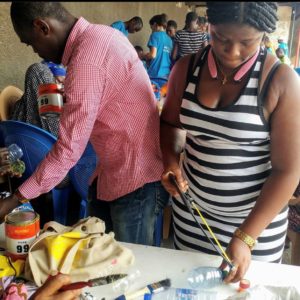
The Earth is Chocking
- By bismark
- September 23, 2021
![]() The past decade shows an increase in plastic production as compared to the whole of the last century. Plastic have contributed remarkably to advances in healthcare and helped raise millions of people out of poverty. In as much as plastics are very durable and extremely cheap, it has proven to be one of the major cause of demise to our planet. Yes, you can make a plastic bag for 1 cedi and it can wrap up every single foodstuff in your home(a very commendable engineering feat) but for every action there is a reaction.
The past decade shows an increase in plastic production as compared to the whole of the last century. Plastic have contributed remarkably to advances in healthcare and helped raise millions of people out of poverty. In as much as plastics are very durable and extremely cheap, it has proven to be one of the major cause of demise to our planet. Yes, you can make a plastic bag for 1 cedi and it can wrap up every single foodstuff in your home(a very commendable engineering feat) but for every action there is a reaction.
The reaction from our single-used cheap plastics and disposable lifestyle is one of leading cause of pollution in our oceans, landfills etc.
As part of measures put in place for Africa to beat plastics, JA Africa in collaboration with the UN environment has come with a challenge to empower the youth to take charge and take necessary actions against plastic pollution.
Giving a voice to No plastics can be somewhat difficult but you will be surprised at how easy it becomes with time. Before then, let me take you through some quick facts about plastics.
Plastics are made from polymers which can be found in nature ; walls of cells, hair, silk and DNA
Plastics can also be obtained by breaking down crude oil into its components to form synthetic polymers.
These synthetic polymers take between 500-1000 years to break down and these are what is being used to make things we throw away after single use.
Do you know that aside the numerous plastic manufacturing companies in Ghana, the nation still imports plastics? Well! Now you know.
Data available at the Environmental Protection Agency(2006) indicates that Ghana imports about 2.58 million metric tonnes of raw plastics annually. Out of that 73% becomes waste at the end of the day while only 19 percent are re-used and only 9% gets recycled . Is this a great feat enough?
Also a report on BorgenMagazine(From Plastic to Profit: Solutions to Plastic Pollution in Ghana ) indicates that 30% if of the 73% plastic waste ends up on our landfills and oceans. As we already know, these plastics take years to biodegrade and that makes the situation even worse. The ones that get destroyed under the sunlight releases poisonous substance into the soil and also cause the ambient air pollution effect when burnt. Marine life get suffocated and entangled from the ingestion of these plastics. What will be our fate if all our fishes suffocate and die from starvation because their stomachs are full with plastics? Not only will they die but we (humans) end up eating this same fishes. So indirectly we are also eating plastics. Although there are no proper evidence to it, I don’t think you want to die of cancer.
The government stakeholders, the media, etc. have crucial roles to play when it comes to plastic waste management in the country but what are you as an individual also doing to put an end to this big problem?
I have personally joined a team of volunteers at Mckingtorch Africa to educate the public on how to recycle their waste.

Photo:Teaching the residents of Nima some basic recycling tips. PhotoCredit: Mckingtorch Africa
I also have a program coming up on YouTube, Instagram and Facebook dubbed “THE GREEN DIALOGUE”. This program is aimed at educating the public on how our individual mistakes are causing us our environment and also to give basic recycling tips.

Please do subscribe and follow on all our social media platforms.
I believe we can all help earth from choking if we take up the responsibility individually to put our quota in the plastic waste management process while the government and stakeholders take the best decision to save our planet from plastics.
I promise to use reusable water bottles, avoid plastic bags, buy from environmentally friendly shops and also reuse and recycle the very little plastics I might skip. Do you pledge same?
Ruth Eyi Adzo Dzokoto (writer)
LinkedIn; Ruth Eyi Adzo Dzokoto
Facebook: @theearthylassie
Instagram: @theearthylassie
Twitter: @theearthylassie
Connect with us on Instagram